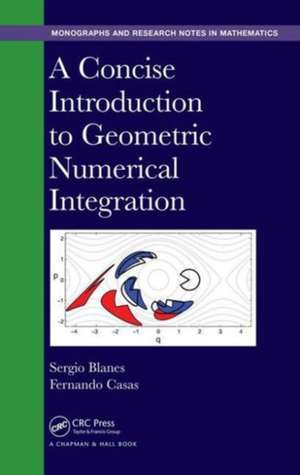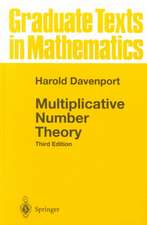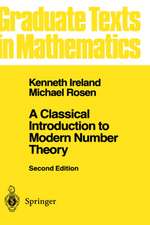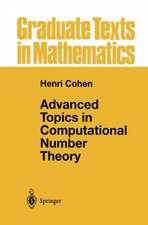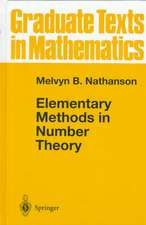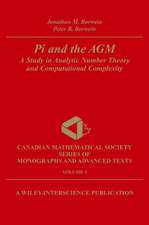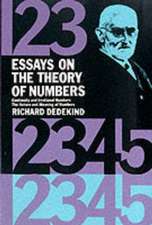A Concise Introduction to Geometric Numerical Integration: Chapman & Hall/CRC Monographs and Research Notes in Mathematics
Autor Sergio Blanes, Fernando Casasen Limba Engleză Hardback – 23 mai 2016
A Concise Introduction to Geometric Numerical Integration presents the main themes, techniques, and applications of geometric integrators for researchers in mathematics, physics, astronomy, and chemistry who are already familiar with numerical tools for solving differential equations. It also offers a bridge from traditional training in the numerical analysis of differential equations to understanding recent, advanced research literature on numerical geometric integration.
The book first examines high-order classical integration methods from the structure preservation point of view. It then illustrates how to construct high-order integrators via the composition of basic low-order methods and analyzes the idea of splitting. It next reviews symplectic integrators constructed directly from the theory of generating functions as well as the important category of variational integrators. The authors also explain the relationship between the preservation of the geometric properties of a numerical method and the observed favorable error propagation in long-time integration. The book concludes with an analysis of the applicability of splitting and composition methods to certain classes of partial differential equations, such as the Schrödinger equation and other evolution equations.
The motivation of geometric numerical integration is not only to develop numerical methods with improved qualitative behavior but also to provide more accurate long-time integration results than those obtained by general-purpose algorithms. Accessible to researchers and post-graduate students from diverse backgrounds, this introductory book gets readers up to speed on the ideas, methods, and applications of this field. Readers can reproduce the figures and results given in the text using the MATLAB® programs and model files available online.
Din seria Chapman & Hall/CRC Monographs and Research Notes in Mathematics
- 9%
 Preț: 1073.18 lei
Preț: 1073.18 lei - 20%
 Preț: 1042.55 lei
Preț: 1042.55 lei - 26%
 Preț: 877.19 lei
Preț: 877.19 lei - 28%
 Preț: 878.82 lei
Preț: 878.82 lei - 26%
 Preț: 878.49 lei
Preț: 878.49 lei - 28%
 Preț: 879.00 lei
Preț: 879.00 lei - 18%
 Preț: 1122.62 lei
Preț: 1122.62 lei - 27%
 Preț: 890.74 lei
Preț: 890.74 lei - 18%
 Preț: 1114.40 lei
Preț: 1114.40 lei - 18%
 Preț: 1285.80 lei
Preț: 1285.80 lei - 28%
 Preț: 875.64 lei
Preț: 875.64 lei - 28%
 Preț: 875.97 lei
Preț: 875.97 lei - 26%
 Preț: 877.59 lei
Preț: 877.59 lei - 27%
 Preț: 889.83 lei
Preț: 889.83 lei - 33%
 Preț: 868.34 lei
Preț: 868.34 lei - 18%
 Preț: 1109.36 lei
Preț: 1109.36 lei - 25%
 Preț: 883.48 lei
Preț: 883.48 lei - 18%
 Preț: 1123.37 lei
Preț: 1123.37 lei - 28%
 Preț: 882.49 lei
Preț: 882.49 lei - 15%
 Preț: 320.58 lei
Preț: 320.58 lei - 28%
 Preț: 874.74 lei
Preț: 874.74 lei - 18%
 Preț: 1113.95 lei
Preț: 1113.95 lei - 15%
 Preț: 496.94 lei
Preț: 496.94 lei - 18%
 Preț: 1283.60 lei
Preț: 1283.60 lei - 25%
 Preț: 456.63 lei
Preț: 456.63 lei - 18%
 Preț: 786.23 lei
Preț: 786.23 lei - 28%
 Preț: 883.33 lei
Preț: 883.33 lei - 28%
 Preț: 876.36 lei
Preț: 876.36 lei - 18%
 Preț: 1106.02 lei
Preț: 1106.02 lei - 20%
 Preț: 392.71 lei
Preț: 392.71 lei - 18%
 Preț: 1110.74 lei
Preț: 1110.74 lei - 18%
 Preț: 1285.98 lei
Preț: 1285.98 lei - 18%
 Preț: 1348.96 lei
Preț: 1348.96 lei - 28%
 Preț: 881.69 lei
Preț: 881.69 lei - 28%
 Preț: 876.38 lei
Preț: 876.38 lei - 28%
 Preț: 875.55 lei
Preț: 875.55 lei - 25%
 Preț: 1200.02 lei
Preț: 1200.02 lei - 31%
 Preț: 865.12 lei
Preț: 865.12 lei - 18%
 Preț: 1132.87 lei
Preț: 1132.87 lei - 26%
 Preț: 878.01 lei
Preț: 878.01 lei - 24%
 Preț: 329.91 lei
Preț: 329.91 lei - 15%
 Preț: 489.26 lei
Preț: 489.26 lei - 18%
 Preț: 1105.24 lei
Preț: 1105.24 lei - 28%
 Preț: 884.13 lei
Preț: 884.13 lei
Preț: 865.13 lei
Preț vechi: 1342.70 lei
-36% Nou
Puncte Express: 1298
Preț estimativ în valută:
165.56€ • 172.21$ • 136.68£
165.56€ • 172.21$ • 136.68£
Carte tipărită la comandă
Livrare economică 14-28 aprilie
Preluare comenzi: 021 569.72.76
Specificații
ISBN-13: 9781482263428
ISBN-10: 1482263424
Pagini: 232
Ilustrații: 23
Dimensiuni: 156 x 234 x 19 mm
Greutate: 0.45 kg
Ediția:1
Editura: CRC Press
Colecția Chapman and Hall/CRC
Seria Chapman & Hall/CRC Monographs and Research Notes in Mathematics
ISBN-10: 1482263424
Pagini: 232
Ilustrații: 23
Dimensiuni: 156 x 234 x 19 mm
Greutate: 0.45 kg
Ediția:1
Editura: CRC Press
Colecția Chapman and Hall/CRC
Seria Chapman & Hall/CRC Monographs and Research Notes in Mathematics
Cuprins
What is geometric numerical integration? Classical integrators and preservation of properties. Splitting and composition methods. Other types of geometric numerical integrators. Long-time behavior of geometric integrators. Time-splitting methods for PDEs of evolution. Appendix. Bibliography. Index.
Notă biografică
Sergio Blanes is an associate professor of applied mathematics at the Universitat Politècnica de València. He is also editor of The Journal of Geometric Mechanics. He was a postdoc researcher at the University of Cambridge, University of Bath, and University of California, San Diego. His research interests include geometric numerical integration and computational mathematics and physics.
Fernando Casas is a professor of applied mathematics at the Universitat Jaume I. His research focuses on geometric numerical integration, including the design and analysis of splitting and composition methods for differential equations and their applications, Lie group methods, perturbation techniques, and the algebraic issues involved.
Fernando Casas is a professor of applied mathematics at the Universitat Jaume I. His research focuses on geometric numerical integration, including the design and analysis of splitting and composition methods for differential equations and their applications, Lie group methods, perturbation techniques, and the algebraic issues involved.
Recenzii
"[A Concise Introduction to Geometric Numerical Integration] is highly recommended for graduate students, postgraduate researchers, and researchers interested in beginning study in the field of geometric numerical integration."
— David Cohen, Mathematical Reviews, November 2017
— David Cohen, Mathematical Reviews, November 2017
Descriere
This introductory book presents the main themes, techniques, and applications of geometric integrators for researchers in mathematics, physics, astronomy, and chemistry who are already familiar with numerical tools for solving differential equations. It also offers a bridge from traditional training in the numerical analysis of differential equations to understanding recent and advanced research literature on numerical geometric integration. Readers can reproduce the figures and results given in the text using the MATLAB® programs and model files available online.
